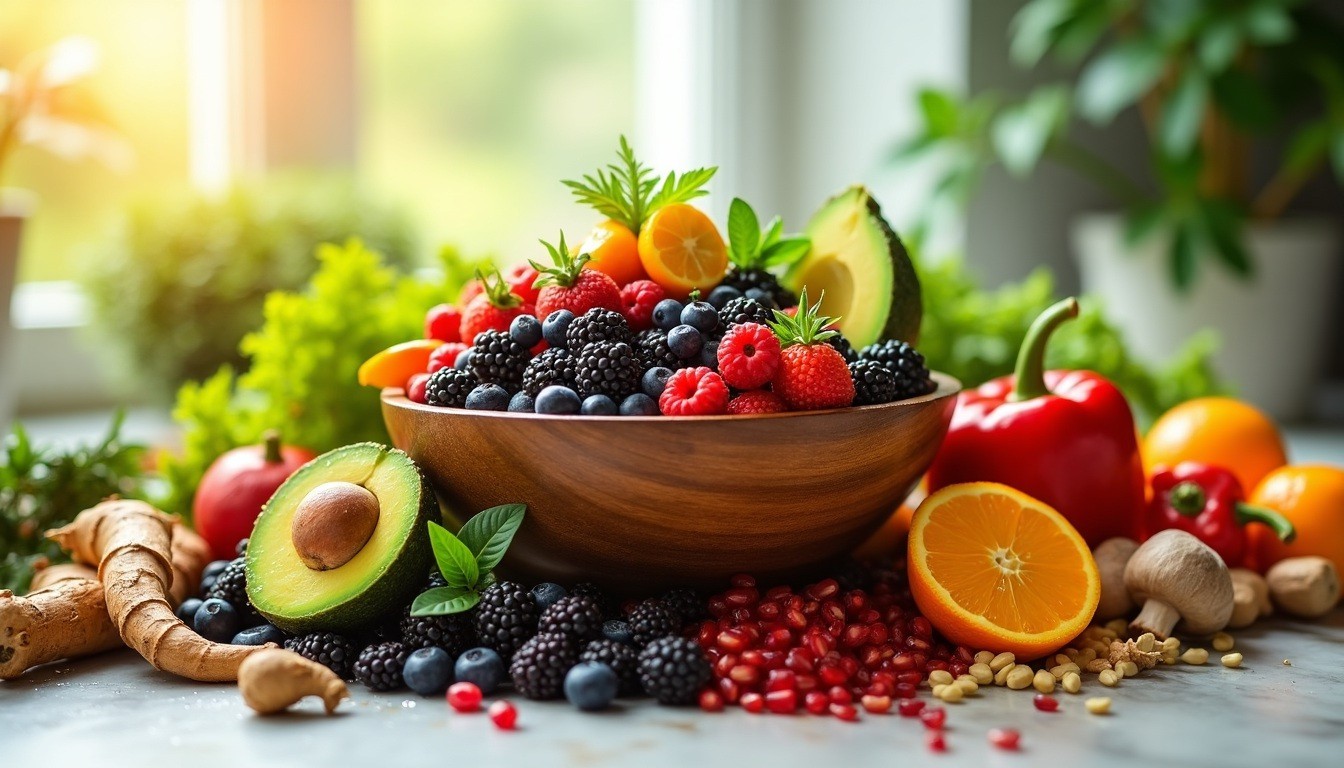

The immune system battles millions of potential threats daily, and diet plays a crucial role in supporting this defence system. Scientific research demonstrates that plant-based foods are among the strongest natural immunity boosters.
Research shows that people who eat diverse plant-based foods have stronger immune function and less inflammation. Plants contain unique compounds that support the body’s defence mechanisms directly. Antioxidants protect cells while fibre nourishes beneficial gut bacteria. The benefits of a plant-based diet go way beyond the reach and influence of simple nutrition. Scientists have repeatedly answered the question “is plant based food good for you” through rigorous research that reveals impressive immune health results.
Scientific research shows how nutrition and immune function work together. The immune system has two main parts: the innate immune system that provides immediate defence, and the adaptive immune system that develops targeted responses to specific threats [1].
A newer study, published by researchers shows that plant-based diets substantially affect innate immunity pathways and antiviral responses [2]. The vegan diet triggers responses connected to the body’s first-line defence mechanisms and supports red blood cell production and heme metabolism [3].
Plant foods contain several vital compounds that boost immune function:
Plant compounds interact with immune cells in multiple ways. Polyphenols, especially flavonoids, show remarkable defence against respiratory infections [4]. These compounds also help neutralise toxins from pollution, processed food, and various pathogens [5].
Research continues to support the immune-boosting benefits of plant based food. People who follow a plant-based diet index (PDI) are nowhere near as likely to need hospitalisation (OR: 0.42; 95% CI 0.22 to 0.80) during illness [6]. This protection comes from the diet’s power to boost antibody production and reduce oxidative stress [6].
Plant-based nutrition and immunity share a connection beyond direct cellular interactions. Dietary polysaccharides increase beneficial bacteria populations and regulate the intestinal environment [7]. These changes support both innate and adaptive immunity and create a detailed defence system against potential risks.
In spite of that, the most compelling evidence comes from recent clinical observations. Scientists have seen quick and distinct immune system changes in people switching to a vegan diet, with substantial effects on pathways linked to antiviral responses [2]. These findings show how quick the immune system reacts to nutritional changes.
Plant-based foods pack an impressive array of nutrients that support immune function. These foods contain compounds that work together to strengthen your body’s defence systems.
A well-planned plant based diet gives you essential nutrients that improve immune response. Several vitamins and minerals play vital roles in your immune health: Vitamin C: Red bell peppers contain almost 3 times more vitamin C than citrus fruits [8]
The protein quality in plant-based foods supports optimal immune function. Plant proteins have unique advantages because they contain more fibre and nutrients that promote gut health [10]. These protein sources include:
Plant-based antioxidants provide remarkable protection against oxidative stress. Scientists have identified these compounds as vital elements that prevent various diseases [12]. Plant-based antioxidants work through multiple mechanisms:
Flavonoids show powerful immune-supporting properties. You can find these compounds naturally in fruits, vegetables, and other plant foods [13]. Research shows that dietary polyphenols, including flavonoids, can lower the risk of various ailments effectively [13].
A high-fibre plant-rich diet with plenty of fruits, vegetables, whole grains, and legumes helps beneficial microbes grow [14]. These microbes break down fibre into short chain fatty acids that stimulate immune cell activity [14].
Scientific discoveries show that gut health is the life-blood of our immune system. Research demonstrates that a plant-based diet helps develop more diverse and stable microbial systems [15].
Dietary fibre and gut bacteria share a remarkable symbiotic connection. Plant fibres boost beneficial bacteria like Ruminococcus, E. rectale, and Roseburia [15]. These microbes then produce short-chain fatty acids (SCFAs) that provide multiple health benefits:
| SCFA Benefits | Effect on Health |
| Immunity | Improves pathogen defence |
| Brain Health | Strengthens blood-brain barrier |
| Gut Function | Provides energy for intestinal cells |
| Disease Prevention | Protects against inflammatory conditions |
Plant-based foods naturally contain prebiotics that feed beneficial gut bacteria. Here are some common prebiotic-rich foods: Chicory root (68% inulin fibre) [16]
Beneficial bacteria produce postbiotics through prebiotic fermentation – metabolites that support overall health [15]. These compounds reduce inflammation and strengthen the intestinal barrier [17].
The gut microbiome shapes our immunity from birth. The first three years play a vital role in establishing a stable microbial ecosystem [18]. Scientists have found that 70% of the immune system lives in the gut [19], which makes the microbiome-immunity connection essential to health.
Gut bacteria communicate with immune cells through several mechanisms and help train the immune system to identify threats while maintaining balance. Plant- based diets support this process by increasing beneficial bacteria that create compounds essential for immune function [15].
A diverse microbiome supported by plant-based foods helps prevent health problems of all types, from gut issues to systemic diseases [15]. These protective benefits reach beyond the gut and influence immune responses throughout the body, which may reduce autoimmune condition risks [1].
Plants contain natural compounds that defend against disease through their unique molecular structures and biological activities. Research shows these compounds can improve immune function and help fight various ailments.
Plants produce bioactive compounds called phytochemicals to protect themselves. These substances show most important immunomodulatory properties through multiple pathways [20]. A detailed analysis reveals their benefits:
| Phytochemical Type | Primary Benefits |
| Polyphenols | Antioxidant, Anti-inflammatory |
| Terpenoids | Antimicrobial defence |
| β-glucans | Immune modulation |
| Flavonoids | Respiratory protection |
These compounds work through different mechanisms and improve both innate and adaptive immune responses [20]. Natural phytotherapeutics have proven to work as immune boosters [20].
Plant compounds match pharmaceutical medications in their anti-inflammatory effects. Studies show that polyphenols reduce inflammation by:
Plants’ disease-fighting abilities go beyond simple nutrition. Many plants contain compounds that directly curb various ailments while providing anti-inflammatory benefits.
Holy basil (Tulsi) contains high levels of eugenol and polyphenols, including apigenin, quercetin, and ferulic acid. These provide excellent anti-inflammatory and immunostimulating activity [20]. Garlic improves immunity by increasing innate immune system cells’ functions, such as lymphocytes and natural killer cells [20].
Quercetin, curcumin, and luteolin show strong immunostimulatory effects on macrophages. They also increase T cells and B cells proliferation [20]. These compounds work together to create a reliable defence system against potential threats.
Plant compounds protect our health through various mechanisms. Regular dietary fibre consumption helps prevent cancer, inflammation, hypertension, and cardiovascular diseases [7]. These benefits extend to better insulin sensitivity and healthier gut microbiota [7].
Scientific evidence supporting plant-based compounds grows stronger. Meta-analyses reveal that people who follow plant-based dietary patterns more closely have a 25% lower risk of ischemic heart disease incidence and mortality [22].
Nutrient planning is the life-blood of successful plant-based eating. Plant-based diets will give a lot of health benefits, but you need to understand specific nutritional needs to get the best results.
B12 needs special attention if you eat plant-based foods because you can’t get it naturally from unfortified plant foods [23]. Research shows that vitamin B12 deficiency can cause serious health issues like anaemia, memory loss, and disorientation [24].
The recommended daily B12 intake varies by country:
People who follow a plant-based diet should eat B12-fortified foods or take supplements that provide 10 micrograms daily [23]. You should chew or dissolve B12 supplements in your mouth to absorb them better [23].
Zinc helps your immune system and other body processes work well [4]. You can get zinc from these plant-based sources: Legumes (lentils, chickpeas)
Whole grains
Vegans need 1.5 times more zinc than the standard RDA [24]. This means: Adults: 8-11 mg
Plant-based diets have non-heme iron, which your body absorbs at 5-12% [24]. You need 1.8 times more iron than standard recommendations if you eat plant-based: Men: 14 mg
Nutrients work better together when you combine them right. Here’s a quick guide to boost absorption:
Iron Enhancement:
Zinc Optimisation:
Mix zinc sources with sulphur-rich foods
Pick sprouted or fermented grains and legumes [27]
Food prep methods can boost nutrient availability by a lot. Soaking, sprouting, and fermenting reduce compounds that block mineral absorption [26]. Cooking in cast iron pots can add more iron to your food [28].
Your body absorbs nutrients better when you spread them throughout the day instead of eating large amounts at once. This works especially well with B12, as your body absorbs small amounts better [23].
Research shows a strong link between plant-based foods and a better immune system. Plant compounds work in many ways to support both innate and adaptive immunity and create a healthy gut microbiome. Plants pack a unique mix of vitamins, minerals, antioxidants, and fibre that you won’t find anywhere else.
A plant-rich diet comes with most important benefits. The research reveals lower inflammation levels, stronger immune cells, and greater resistance to diseases. Plants protect our health through several paths. They feed good gut bacteria and provide vital phytonutrients that curb oxidative stress.
Some people worry about missing nutrients, but good planning will give a complete nutritional profile. Smart food pairings, supplements when needed, and focus on nutrients like B12, zinc, and iron help people on plant-based diets stay healthy while getting extra immune support.
Plant-based eating is a proven way to naturally boost immunity. Don’t call it a restrictive diet – it’s a chance to explore different nutrient-packed foods that improve overall health and guard against disease.
Q1. How do plant-based foods enhance immune function?
Plant-based foods contain various compounds like vitamins, minerals, and phytochemicals that support immune cell function. They also provide fibre that feeds beneficial gut bacteria, which play a crucial role in immunity.
Q2. Can a plant-based diet help reduce inflammation?
Yes, plant-based diets are rich in anti-inflammatory compounds like polyphenols and antioxidants. These substances can help suppress pro-inflammatory cytokines and protect against various inflammatory conditions.
Q3. Are there specific plant foods that are particularly beneficial for immunity?
Several plant foods are especially good for immunity. For example, red bell peppers are high in vitamin C, garlic boosts natural killer cell function, and holy basil (Tulsi) has excellent immunostimulating properties.
Q4. How does a plant-based diet affect gut health and immunity?
Plant-based diets promote a diverse and stable gut microbiome. The fibre in plant foods feeds beneficial bacteria, which produce short-chain fatty acids that enhance immune function and strengthen the intestinal barrier.
Q5. Can I get all necessary nutrients for immune health from a plant-based diet?
With proper planning, a plant-based diet can provide most nutrients needed for immune health. However, special attention should be given to vitamin B12, zinc, and iron. Fortified foods or supplements may be necessary, especially for B12.






Accepting payments via


YourHealthBasket © 2025
detoxpeople Ltd
Registered in England & Wales 07156741
VAT reg GB 103 3641 60
Our new practitioner portal has been released and it’s now easier than ever to link a client’s account and provide them with suggestions using our new protocol system.
Convert your current cart into a protocol which can then be assigned to a linked client.